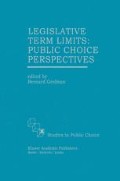Abstract
To understand the purpose of a social institution it is sometimes useful to examine a society in extreme circumstances. A good example of such a society is civil-war torn Bosnia. Bosnia throws light upon the social institution of term limits. In March of 1994 the Croats and Muslims of Bosnia announced that they would end their war and together form a new country under a new constitution.1 A key aspect of their new constitution is a “rotating” presidency. The Bosnian presidency will rotate between the two groups—Muslim, Croat, Muslim, Croat . . . etc. If we accept for the moment that rotation in office and term limits are closely related, as I will argue below, it is clear that Bosnia has much to teach us about term limits. The extreme which Bosnia represents is an extreme of conflict. Conflict almost surely must play a role in explaining Bosnian term limits. The civil war illustrates that both the Muslims and Croats have reason to fear exploitation from the other group. One explanation for the rotating presidency is that it limits the possibilities for exploitation. The Croats are less likely to use the presidency to exploit the Muslims if they know that next period the Muslims will be in a reciprocal position (and vice-versa). The Roman orator Cicero argued for rotation in office on these grounds, writing that “he who commands should reflect that in a short time he will have to obey.”2
Access this chapter
Tax calculation will be finalised at checkout
Purchases are for personal use only
Preview
Unable to display preview. Download preview PDF.
Editor information
Editors and Affiliations
Rights and permissions
Copyright information
© 1996 Kluwer Academic Publishers
About this chapter
Cite this chapter
Tabarrok, A. (1996). Term Limits and Political Conflict. In: Grofman, B. (eds) Legislative Term Limits: Public Choice Perspectives. Studies in Public Choice, vol 10. Springer, Dordrecht. https://doi.org/10.1007/978-94-009-1812-2_16
Download citation
DOI: https://doi.org/10.1007/978-94-009-1812-2_16
Publisher Name: Springer, Dordrecht
Print ISBN: 978-94-010-7307-3
Online ISBN: 978-94-009-1812-2
eBook Packages: Springer Book Archive

